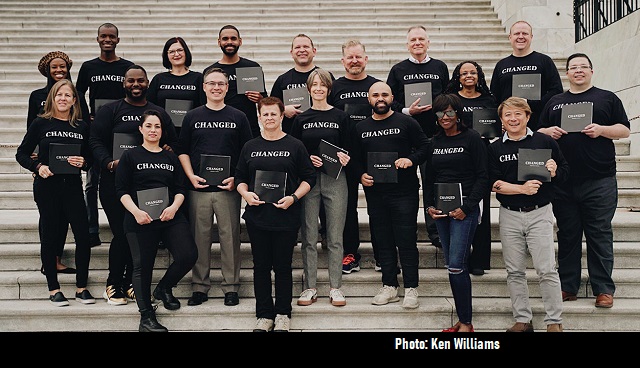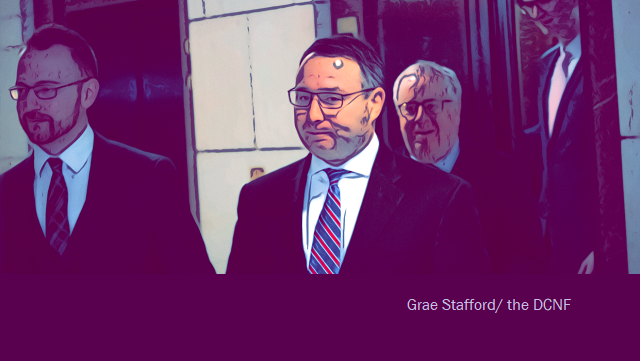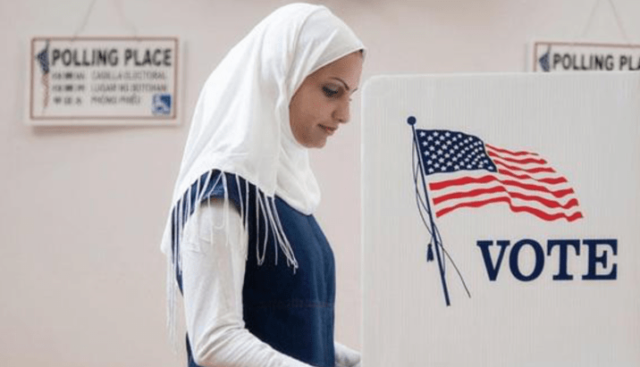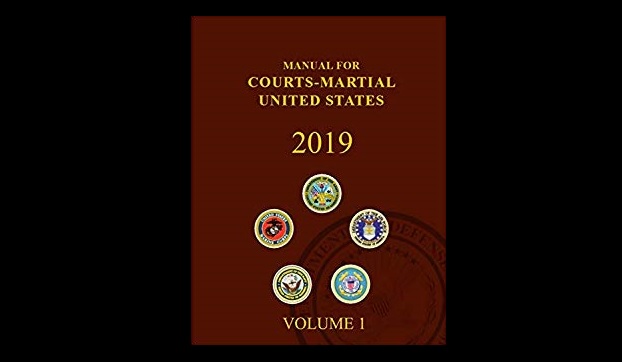
Those struggling with same-sex attraction or hoping to walk away from a homosexual lifestyle may find some encouragement from Liz Flaherty and Elizabeth Woning, who both once lived a lesbian lifestyle.
While leading their own organizations to help individuals transition out of homosexuality, Flaherty and Woning are also a part of a growing movement called Changed—a supportive and loving community of those who once identified as LGBTQ+.
In today’s episode, we sit down with Flaherty and Woning to hear their stories and discuss some of the current legislation being advocated that could have detrimental effects on organizations that offer counseling services for those struggling with homosexuality. Read the lightly edited transcript, posted below, or listen on the podcast.
Virginia Allen: I am joined by Liz Flaherty and Elizabeth Woning. Liz and Elizabeth both lead or co-lead Christian organizations that work with people who are seeking to walk away from the homosexual lifestyle or who are struggling with same-sex attraction. Liz and Elizabeth, thank you both so much for being here.
Liz Flaherty: Thank you.
Elizabeth Woning: Thank you.
Allen: So Elizabeth, you co-lead a ministry called Equipped to Love in California with Ken Williams. And we actually interviewed Ken [on the] podcast back in May and heard a bit about his journey from struggling with same-sex attraction to now being married to a wonderful woman and having a family. But today I would love to hear a bit about your story.
You lived as a proud lesbian for quite some time and even as an openly homosexual pastor in the Presbyterian church. So when did you first come out as a lesbian and how long did you live in that lifestyle?
Woning: It’s a little bit hard for me to say when did I first come out because I first really started questioning my sexuality when I was 16, when I first got involved with a woman. But I still tried to make relationships with men work. I still dated men. I got married briefly after graduating from college. So in all of that time I didn’t come out. But here I was questioning.
So I think it’s important that people recognize that the point at which you come out is not the time when you begin your lesbian life. Like for most of us, starting as a very young child is when the confusion begins. And so I had years, and years, and years of grappling with whether I was a lesbian before actually coming out. But I had a mental breakdown while I was married to my first husband.
And after coming out of the hospital, really, I decided that I would come out. And so I left my marriage and moved into a metropolitan gay community and started that new life. And I lived in the community for about 10 years before going to seminary, openly gay, which was a really big deal. Now, it would be a big deal today, but that was 20 years ago when I did that. And so 20 years ago, it was a monumental deal.
At the time, I was an elder in my local church, and when I decided that I would pursue a seminary degree, I remember telling my pastor—of course I had been talking to my pastor for about a year as he was really ministering to me as I struggled with mental illness.
I had been diagnosed with bipolar disorder with that first hospitalization, and so I was grappling with how to survive my life really, and I felt that going the route of doing a seminary degree and pursuing theology was something that would give me really deep hope and purpose.
And so I was going that route. But that meant coming out to my church. I was an elder in my church, and so coming out to my church, the first thing that happened was I was asked to resign [from] my position as an elder, even though I didn’t have any intention of being in a relationship with a woman. Back then, the phrase that we used was chastity and singleness.
So I was going this route of pursuing a seminary degree in a really nonsensical environment. I was one of probably five or six students that they admitted who were gay, openly gay. And the Presbyterian church was not ordaining gays and lesbians. So it was a big deal.
While I was in seminary, we were grappling with how to understand our sexuality in the context of Scriptures. So there was a great rewrite of the Bible that took place in that season for my life. And really, it wasn’t until I graduated from seminary and began trying to do ministry.
Now I understand I couldn’t be ordained, but I had a heart to do ministry. It was really in that first year after I graduated that I had an encounter with Jesus that caused me to begin questioning my theology, the doctrine that I had believed.
Allen: Could you explain just a little bit about what that looked like? What kind of shifted in your mind, or what did the Lord shift or change in your heart to where you all [of] a sudden realized, “I don’t want to be living this way anymore”?
Woning: Well, put in the context of my life at that point … by that time [I had] had about 10 years of managed care for mental illness. And so I didn’t have kind of walking depression where you kind of cope with life and you work in your job. No, I had very, very severe bipolar disorder. And so I was not really high-functioning in a way.
By the time I graduated from seminary, I finished my year with a 30-day hospitalization. So I was really desperate. And in that season I met a charismatic pastor and he invited me to a youth outreach meeting where the Holy Spirit showed up and in … I always call it the worst case scenario for a Presbyterian.
It was total chaos. People laying on the ground, kids being filled with the Holy Spirit and speaking in tongues, mayhem like I’d never seen before. Because I was a dignified hymn-singing Presbyterian.
In that context, a 17-year-old boy approached me with what he called a word from the Lord. And it turned out to be a very specific answer to something I had been praying about. And I was having a crisis of faith at that time. And I thought, for the first time in my life, I thought God knew specifically who I was. …
As a seminary graduate and a theological student, I knew God was there. I knew he was existent, but I didn’t know he was a relational. And that caused me to have this moment where I thought, “If he knows who I am, then I have no idea who he is.”
And I began a study. … That’s my context for connection with God, I study. And so I … completely re-read the Bible and took a close view at what did God say specifically about himself? In fact, I did this entire study, not questioning my sexuality, not questioning my identity, but questioning his. And it was in the context of that study that I began to see something entirely new and fresh that I’d never seen before that I wanted to be a part of.
I began to question whether there was something in my life that had hindered me from experiencing that. And that’s what caused me to question my sexuality. I thought, “Has my mind, my life, my dedication to this theological view driven me away from God?” And when I began to unpack that, I found perhaps that it had and I began repenting.
I just began following this walk of identifying what holiness was and [what] righteousness was. And I recognized that God perhaps could give me life.
So in the context of I had tried to commit suicide, I was, although I started my college career at 20-ish, really very hopeful for my life. By that point, I was in desperate need and he began to give me the thought that I had value and he was pursuing me. And so it became the most important thing in my life to experience communion with God. With that, I was willing to question my sexuality, question my theology, question my lifestyle.
So, at that point in my life, I didn’t own any women’s clothes. I shaved my head, I had many piercings. I have several tattoos. So, I went through a very personal, internal, complete breakdown of everything that I had believed just for the sake of experiencing communion with God.
Allen: Wow. Elizabeth, thank you so much for sharing. That’s just incredibly powerful to hear and just so significant to hear what you personally experienced. And Liz, I want to take a minute to ask you a little bit about your story.
Flaherty: Sure.
Allen: You’re the executive director of a ministry based in Tennessee that also works with those coming out of the homosexual lifestyle, or are struggling with that same-sex attraction. So what was your journey into and then out of the lesbian lifestyle?
Flaherty: Sure. And I just have to say, I never tire from hearing [Elizabeth’s story], even though we do functions together and we hear our stories all the time, every single time, it’s just so wonderful. I get another nugget of God’s goodness in each other’s stories. So thank you Elizabeth for sharing that.
So, I grew up in Northern California. My parents were pastors. … And they had two high-paying jobs at Hewlett-Packard in Silicon Valley. I was born in Silicon Valley and we moved up to this little town of 1,200 people when I was 7 to pretty much become missionaries is the way I put it. And I very much struggled early on with feeling that I belonged and that I had a voice and that I was received.
I think growing up, as a contrast, in that environment, highly liberal environment, being one of the few Christians. Although I dearly love that community, I value what we took from that time there. But, in that, … we were just trying to survive financially, socially.
My parents worked very hard at feeding the transients going through the town, the homeless, and dealing with a lot of mental illness that was coming to their door. The church was right next to the house. So with that I struggled with a lot of anxiety and depression and I told people I was probably agoraphobic, just not diagnosed, because I had such bad anxiety. I couldn’t travel, I couldn’t go on field trips.
They tried to homeschool me. I was in and out of the school system. And so there was a constant trying to just assimilate into the normal life of my peers.
And to back up a little bit, I was molested at the age of 6 by a family member. And that definitely set me on a projection of putting up barriers toward men to protect myself.
Of course you don’t realize until later on that that’s what was happening in your life. But the narrative of my life began to change from a beloved daughter of God to one who was scarred and renamed by that abuse.
So with that, I enter into sort of those formative years. I was being bullied. I just carried such a spirit of rejection. I was a super heavy kid, chunky girl in a small town. And so in this fish bowl, so to speak.
With that … I found [myself], even though I tried to intimately connect with men, just doing all I could to not feel abnormal because same-sex attraction started to enter in, like Elizabeth said, early on in my adolescence.
So that just looked like when I was with my friends … I felt safe. I could connect, I could open up. I felt valued. When I was with any sort of male peers, there just was not a connection.
And I experimented, or I lost my virginity at 17. I tried. I tried to press in … so that wasn’t happening. And I think I just grew tired of not being very open and transparent with where I was. I would go to church and my parents just love the Lord. …
My parents just loved the Lord. They both had come out of a lot of sexual brokenness and had stories of the Lord redeeming them, and they were amazing. At the same time, it just felt like there was no power of the gospel transforming our lives; we were just surviving, trying to keep our heads above water.
So with that, I reasoned, “I am lesbian. This is why I can’t connect. This is why.” Even though I knew the Word said it was wrong, I knew that it was an error of our theology. I didn’t see any way out of my pain.
So I came out my senior year, much to the confusion and pain of my parents, and I moved out. I went to college in Eureka, California, which is a very interesting place to go to school, and just tried to live my life out with my peers and be on my own way. And during that time, during my first semester of college, my mom passed away of cancer very suddenly. And so that left me very much spiraling.
There came a point where … I didn’t really have a grid for grace. I didn’t understand that I could move toward the Lord in my brokenness. It was very much … I would sober up. And I was pretty addicted to pornography since the age of 12, wherever I could have access. And now that I’m in college and I have full access, I’m just deep in sexual sin and relationships.
And although I say I was not a very successful lesbian, because I was not a very social person, so, “I had all these barters.” Nope, it was on me. I was pretty much a loner.
But with that, I had an encounter with the Lord midway through college, and I was high in my living room and my roommates were gone and … I know it was the looming of the Lord, this moment where I said, “I don’t think I’m supposed to talk to you right now; I’m high, but I have no way how to get out of this. I know this isn’t life.”
And in that despair, I felt the Holy Spirit come in the room and it was like this bursting, fresh breath that I had been so longing for. And I just knew in that moment, I had surrendered and he had responded in love. And I went on this journey through the next few years of having a grace to come out of pornography and lay down my relationships, or my few relationships, and to allow him to guide me.
A whole world opened up from that. But I still went to a school of ministry at Bethel. That’s how Ken and I have known each other about 20 years from the changed moment.
So with that, I still walked through a time of having same-sex attraction, but surrendering to the Lord and being sober, I guess, is what you would call it. And it wasn’t until I hit another trauma in my life where my dad passed away; it was only three years after my mom. And my brother had come to live with me and he was nine years younger. So I reached this place again of brokenness, of, “OK, I don’t know how to manage my sexuality any longer. I can’t sustain on where I’ve been with you, Lord.”
And through some failures, moral failures, it led me to a ministry called Living Waters. It was there that I met with men and women who had walked the same struggle and part of that authority of like, “Here’s how you walk with the Lord in your sexuality.” …
The Lord just is so kind and so generous and … I’m amazed at what he’s done, that I get to go and share, my deepest, painful failures and what he has done and redeemed it.
And I’m married. I’ve been married for 14 years to my wonderful husband, Andy, and so it’s just such a joy to walk others through that and see the Lord do the same transformation.
I don’t struggle with same-sex attraction anymore. As I healed from the trauma of abuse and things like that, those barriers came down and I understood my heart more and how the Lord had created me to welcome in the masculinity, really.
Allen: Liz, thank you so much for sharing.
Woning: Wow, so good.
Allen: So good. And now you all are privileged to walk with other people who are walking a similar road or are struggling with those same things that you all have walked through.
So what do you say when a young woman or any woman comes to you and says, “I’m attracted to other women”? Or a young man comes to you and says, “I’m attracted to other men”? What’s that first thing that you say to them?
Woning: Well, typically … I just resonate with them. … Depending on why they’re coming to me, the very first thing I do is listen to everything that they have to say.
I love inviting people into my space because I completely understand what they’re going through. And very few people have the opportunity to just completely expose themselves early in their pain with someone who’s been there. And so, I don’t know about you, Liz, but I’m sure you’re very similar in that.
Flaherty: Yeah.
Woning: There’s actually something, honestly, very healing [about] being able to expose some of that deep pain and being seen. And then beyond that, then I simply start working on connecting to the Lord.
My first two steps are, I’m going to listen very deeply, but then I’m also going to make sure that that person knows how to hear from the Lord, because ultimately, nothing I say is going to be as important as what the Lord has to say.
Flaherty: Absolutely. Yeah, yeah.
Allen: … I know I’ve had these conversations with friends of mine who’ve come to me and said that this is something that they’re struggling with, that they’re struggling with same-sex attraction, and it’s honestly difficult in those moments to know how to respond and really how to love them well.
So what would you say to friends, to family members who—you maybe have had these conversations—will have these conversations with people that they love dearly? How do we walk with those that we love through this?
Flaherty: I think what’s really important is to start with our own narrative with the Lord and our own brokenness, and not so much making it about the specific manifestation of that, but actually understanding our own walk with the Lord and how … the power of the gospel translates to every need and covers every sin. …
I think when you disarm that … like, there’s this pinnacle sin of homosexuality. I’m not saying that there aren’t different consequences to different sins, but when you bring it back to, “We’re here. We’re happy to be with you. We love you and we want to hear what’s going on in your heart. Let us share about what the Lord did in our life.”
And you come in that posture of humility that disarms a lot of fear. I think people have a tendency to hide when they think they’re going to be persecuted, and creating a space where, like, “No, we all come before the Father in the same way.”
Woning: I think most of us who have experienced same-sex attraction have a deep sense of rejection. I think it’s first internalized rejection; I think you’re rejecting yourself. There’s an element of that there, and so then you tend to project that onto every person around you. And there’s so much fear.
Rejection is so painful and there’s so much fear that everyone will reject you. And so then most Christians grapple with, “OK, how do I tell you, ‘Please don’t embrace this life’?” And so that creates actually this, “All right, I don’t get to embrace this sense, this thing that is feeding my need for intimacy.” So it just perpetuates that self-rejection.
So it’s a very complex issue. It’s very complex how to meet it. And so one of the key things for me is making sure that there’s a bridge where people can fully express themselves and feel fully seen and valued in the conversation.
Your first contact with someone when they come out is not to correct their behavior, it’s to meet them right where they’re at and to be available to walk with them through everything. And so it’s to say, “Oh man, I’m so sorry. How is this impacting your life and how do you want me to support you?”
And it might be, “I want you to embrace my lesbian life.” And that, I think, that’s the deer-in-the-headlight moment for a Christian, where you say, “No, I don’t think I can embrace that in your life because I don’t see that that will bless you. God’s not going to bless you in pursuing that lifestyle, but I’m going to be with you in this as you grapple with this. And I want you to know that I will never sever our relationship on this issue.”
Because honestly, even our friends or our children who come out who want to go pursue that life, they’re pursuing it because everyone has a deep-seated need for intimate connection with other people and this is the way that they see most clearly will satisfy that need.
And if there isn’t some superseding opportunity, like the love of Jesus and the supportive parents and friends, if there’s not something that can also meet or compete with that need for intimacy, then there’s no help that can be given.
Allen: Yeah.
Flaherty: I think, if I can just speak to parents—my father, when I came out my senior year, he did ask me if he could find help for me. I wouldn’t take it because I didn’t really see how they weren’t helping themselves.
So that’s a real key that I tell parents is, “Make sure that you have, really, a lifestyle of going after wholeness in your own life, dealing with things that might be holding you back in intimacy in your relationship.” Just asking the Holy Spirit, “Lord, is there work here that we could be doing with you, partnering with you to demonstrate to our children, ‘This is the path that you grow in the Lord. This is the path that you address things’?”
And my father told me, “I can’t. I’ve gone to the Lord, I’ve gone to the Word. I can’t accept this as, I’ve tried,” because he saw the years of rejection of how I grappled with this, and so I think there was a part of him that actually wanted to support me in this, that maybe this road, I’d find fulfillment. But because he went to the Lord and he held to this boundary, it was a place I could come back to after … the Lord was willing me back.
So I just would say, don’t be afraid to hold to your convictions in a way that leaves the door open to your children, but your home is to be an atmosphere of the Lord.
And I know that manifests in different ways and that you could have a whole podcast on that, but just to say, it will feel heart-wrenching because you want to draw your children close and sometimes they’re choosing to leave with their inheritance.
Allen: Yeah. Well, and of course, this is an issue that increasingly we’re seeing in America, that the LGBTQ community is getting louder and you can’t ignore it any longer.
So with legislation such as the Equality Act, how are you all viewing that sort of thing? If that was passed, what kind of effect would that have on the work that you all are doing, ministering and working with those and counseling those that are maybe seeking to come out of this lifestyle?
Woning: Well, first of all, H.R. 5, the Equality Act, and similar bills like that … I think the No. 1 impact that that’s going to have is the imposition of an ideology that all of us who’ve left the LGBTQ life … So anyone who has gone to the work of questioning their sexuality and found resolution, like Liz and I have, we know that perpetuating the lifestyle, at least for women, places this bondage essentially on a person, never opening the door for them to understand kind of repressed needs, repressed traumas.
So we’re imposing an ideology that would perpetuate brokenness, emotional brokenness, on a generation.
I talk to so many people who might never entertain the possibility of being gay or lesbian were it not for unobtrusive thought, someone’s bullying or someone’s suggestion, “Oh, you’re gay. You’re a lesbian. You don’t meet the stereotype for what a man or a woman is and so therefore you’re obviously lesbian or gay.”
And if just the mere suggestion would cause you to begin questioning your sexuality … Because for me, for example, until I met my first girlfriend and we began exploring lesbianism, I had never heard of it. I’d never entertained that idea. And that was years ago. But nevertheless, it was a new thought for me. And that thought then became, “Oh, this must explain why I am the way I am.” And there was not any other narrative offered. …
So Ken and I have formed this movement that’s become a movement called Changed of people who have this story of coming out, so that there’s this other narrative that’s offered. And it’s not a rhetorical narrative. It’s stories, so that people begin to say, “Oh, there’s another way.”
So H.R.5 would put this blanket over that and then stifle the opportunity to share those stories. Real censorship. Censorship is happening now.
What will happen when it becomes illegal to suggest there’s another narrative, which is what H.R.5 would do? It would stifle the voice of every Christian pastor to share the full gospel or to make restrictions on a church’s ability to protect its leadership against an ideology … And no opportunity for dissent.
So that bill doesn’t just impact us and how we help people who are realizing, “Hey, this could not be the ultimate truth of my life,” but then it stifles any opposite narrative in such a totalitarian way. …
I can hardly express how odd H.R. 5 is. It saddens me that America is willing to entertain a bill that would supersede the protections that the 1964 Civil Rights Act gives African Americans.
So it’s like America is willing to forget the current endeavors of the African American community that stand on the Civil Rights Act and divert its attention to the LGBT issue. I think that’s a travesty, really. But then beyond that, the restrictions that this bill poses are really dramatic for American liberty.
Allen: Elizabeth, you also mentioned a Senate bill that you’re quite concerned with. Can you speak to that for a moment?
Woning: Yeah, so there’s a Senate Bill 2008 and a matching House Bill 3570. They are called the Therapeutic Fraud Prevention Act. And those center on the dialogue around, I’m going to say it, conversion therapy, which, honestly, no one’s quite sure what that is. Everyone has a different opinion of what that is, and there is actually no definitive understanding.
And the LGBT community would say any sexual orientation change effort, that would be everything from an altar call asking you to repent to meeting with a licensed psychotherapist, would be conversion therapy.
But it would hinder anyone questioning their sexuality from pursuing restoration or resolution of conflict when they feel that there is an inner conviction that it’s not the truth in their life.
So basically it says, “No, if you’re questioning your sexuality, there’s only one path for you, and that’s to embrace lesbianism, and every other opportunity should be banned.”
And there’s not any scientific evidence. There’s not enough [studies,] really, that indicate that it should be banned. But it is definitely our politicians caving to what is politically correct in America. And I mean, I can go on at length for that. That’s an entire podcast, really.
Allen: Yeah.
Woning: [There’s a] significant lack of study and help for people who are questioning their sexuality because of political correctness. There’s an entire history with the American Psychiatric and Psychological Associations of really recusing themselves from real, direct scientific study and pursuit of clinical help for people, based on political activism from the LGBT community.
And that activism has created this vacuum where certain helps for people who are questioning their sexuality [have] simply … never been offered, they’ve never been pursued … by the APAs. What we presume today is impossible is really based on years of a great wall of never even pursuing understanding. So, there’s a lack in America of professional care for people.
These Therapeutic Acts, they are actually perpetuating brokenness in our culture. And I really wish that the APAs would promote study that would help, that they would actually raise up some adequate professional care for people who are questioning their sexuality, particularly for women, because scientifically what we see for women is that sexuality tends to be much more fluid.
And then there’s the added problem that many women who are sexually abused pursue a life of love of lesbianism because they don’t feel safe with men. So there’s added complexity for women in this issue.
These bills would say, “OK, even though you’ve been sexually abused or molested, if you have same-sex desires, we’re going to assume that they have nothing to do with that abuse, and you don’t have the right to any care other than affirming care for that new sexual orientation.”
Allen: Liz and Elizabeth, you all are here in Washington, D.C., to talk to a number of different leaders about this, about this sort of legislation, how it would affect the work that you all are doing. Have you been receiving a positive response from those on the Hill? What maybe have been some of those interactions? What are your hopes for some of those interactions?
Woning: … First of all … the main reason we’ve come to Washington is to share our stories. Really the mandate for Changed and the Changed Movement is just to share our stories because no one here gets to hear from us. And so, most of what we’re doing is just doing that.
We’ve been received with curiosity mostly. And people who might presume that we’re anti-LGBT really don’t know what we’re doing or talking about.
On the Hill we’ve mostly raised eyebrows. And I think that when people talk to us, they realize that we [are] coming in as low as we possibly can, trying to create an atmosphere of dialogue and conversation around this divisive issue, so that there’s a new way.
We just need a new way to dialogue about this issue in America, and I think Americans are capable of embracing that.
Allen: Well, Liz and Elizabeth, I am so thankful for you all joining The Daily Signal Podcast and for your time today. Really, really appreciate it.
Woning: Thank you so much.
Flaherty: Thank you.
Woning: Can I just say that the Changed Movement right now has a growing Instagram page. And I’d love to invite people to it. It’s just more and more of our stories. You can find us at @changedmvmt.
And we also have a closed Facebook page that people can come into, comprised of people who are questioning their sexuality or people like Ken and I and Elizabeth, or Liz, who have found complete restoration in their sexuality.
There are so many men and women who have gone the route that we have, who now are married. Many have their own biological children, who have moved on with their lives. And so, there are things happening right now in America and across the world.
Honestly, I want to call it revival, that God is meeting LGBT people, sharing with them that he loves them, calling to them with wholeness, and really meeting their deepest needs for intimacy. And I think that we’re about to see something incredible happen across the world because LGBT people know how to do community well. They know how to support one another well. And when they come into the church, there’s just such a beautiful dynamic of care and concern for each other.
The church really needs the LGBT community. They need to embrace people who’ve experienced same-sex attraction and learn what it means to love sacrificially once again. I think God’s really restoring the church in this generation.
So, even though we’re seeing this huge conflict in America, it might look very dark, a lot of us want to say, “Oh, it’s the end and we’d better just buckle down,” there’s such a huge silver lining. There’s such a huge silver lining. God is going to do something incredible through what’s happening right now.
Allen: Yeah. OK, one more time, can you share your social media and your websites?
Woning: The Changed Movement can be found on Instagram at @changedmvmt, #changedmovement. Same thing on Facebook. Or equippedtolove.com, which is where Ken and I can be found at Bethel Church.
Flaherty: And mine is lizgflaherty.com.
Allen: OK, great. And we’ll be sure to have links for all of those in our show notes.
Woning: Thank you so much.
Allen: Thank you all again. Really appreciate it.
Woning: Thank you.
COLUMN BY
Virginia Allen is a contributor to The Daily Signal. Send an email to Virginia. Twitter: .
RELATED ARTICLES:
Ex-gays descend upon D.C. to lobby against LGBTQ rights
Sexually Explicit Books Were Put in These Virginia Classrooms. Parents Want Answers.
‘I’m Black, I’m Supposed to Be a Democrat’: 2 Women Explain Why They Veered Right
HHS to Lift Obama-Era Restrictions on Grants for Faith-Based Adoption Services
A Note for our Readers:
With the demand for socialism at an all-time high among our young people—our future leaders and decisionmakers—the experts at Heritage stopped and asked a question that not many have asked:
Is socialism really morally sound?
The researchers at The Heritage Foundation have put together a guide to help you and our fellow Americans better understand the 9 Ways That Socialism Will Morally Bankrupt America.
They’re making this guide available to all readers of The Daily Signal for free today!
EDITORS NOTE: This Daily Signal podcast is republished with permission. © All rights reserved.















